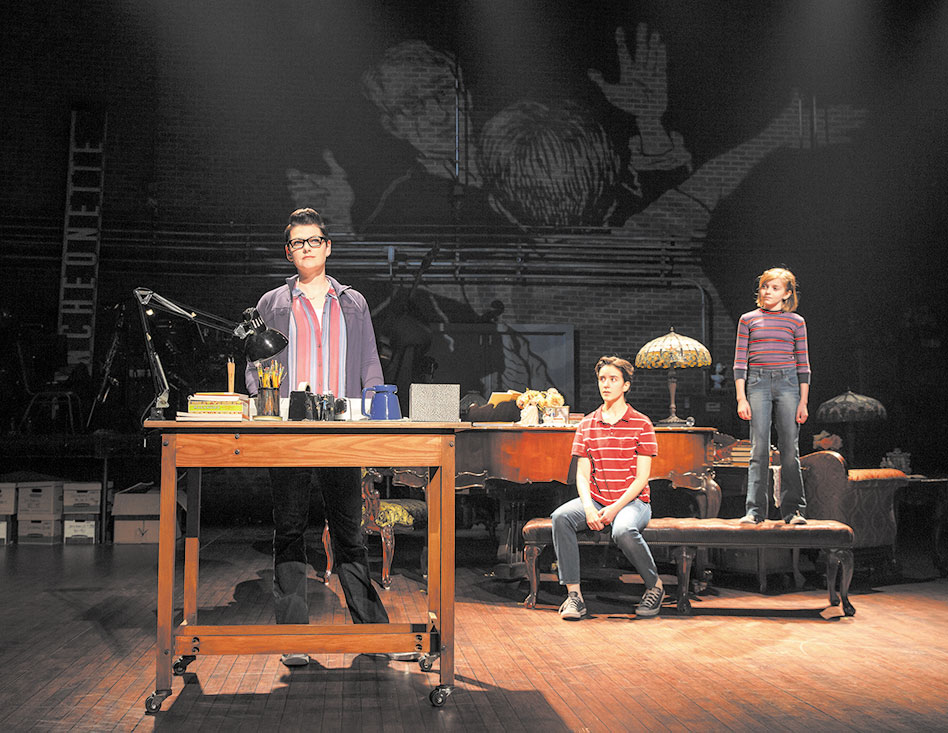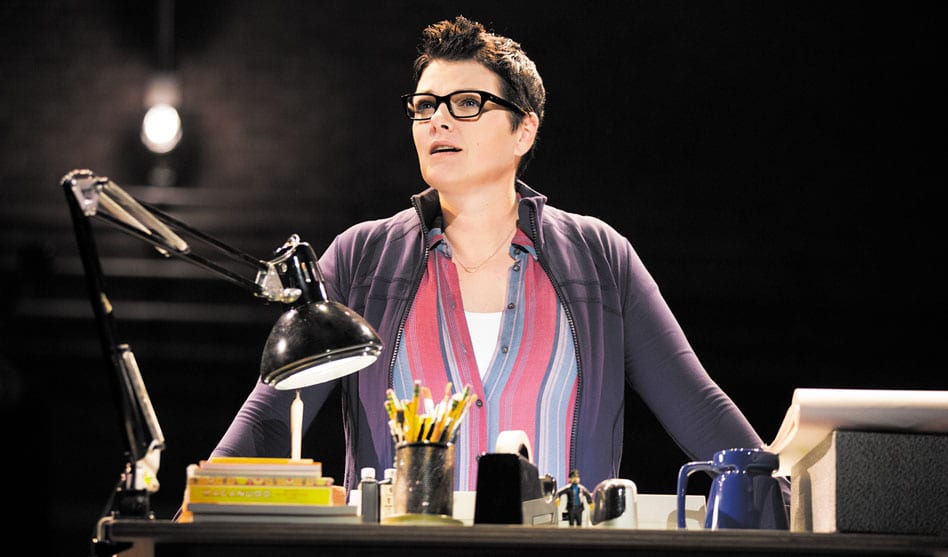Kate Shindle isn’t a lesbian, but she plays one on stage — the lead role of Alison in the award-winning musical Fun Home. (Photo by Joan Marcus)
Kate Shindle believes that Fun Home has an important lesson for everyone about living an authentic life
Tammye Nash | Managing Editor
nash@dallasvoice.com
Kate Shindle is not a lesbian, but she does play one on stage. She wants to make sure people know that.
No, Shindle isn’t worried that someone might think she actually is a lesbian just because she plays the lead role in the Broadway touring company of the Tony Award-winning play Fun Home. She just doesn’t want people in the LGBTQ community to think that this straight women claims to know all about their life experiences as LGBTQ people.
Fun Home, which won five Tonys in 2015, is based on the graphic novel by lesbian cartoonist Alison Bechdel, a memoir about growing up as the lesbian daughter of a closeted gay father and how she began to come to terms with her identity and her father’s suicide. (Bechdel’s cartoon, “Dykes to watch out for,” used to appear in Dallas Voice) Shindle, an actress, author and former Miss America, plays the role of grown-up Alison in the musical by Lisa Kron and Jeanine Tesori based on the book (“Medium Alison” is played by Abby Corrigan and “Small Alison” is played by Carly Gold and, in some performances, Jadyn Schwartz.)
The play opens in Dallas, at the ATT Performing Arts Center, on Wednesday, Sept. 13, and runs through Sept. 24. A special Pride Night performance will be offered on Tuesday, Sept. 19.
“I think there is a certain amount of understanding you can gain through research and through talking to friends and colleagues about their experiences [as LGBTQ] people,” Shindle said in a telephone interview Wednesday afternoon, Sept. 6. “But there is always going to be that other 10 percent that I haven’t lived, so I can’t fully understand. I want to be respectful to that.
“There is only so far that your imagination can take you,” she continued. “But seeing it through that lens, my impression is that there’s not necessarily just one experience” that speaks to everyone about being LGBTQ, about coming out, about living an authentic life.
Even though she is straight, Shindle is no stranger to the LGBTQ community. She has long been active as an advocate on HIV/AIDS issues and as a visible and vocal ally on LGBTQ issues. So when she found out that producers were casting for the touring company of Fun Home, she went after the role of Alison with gusto.
“I first saw the show after it had won its many Tony Awards and already had great acclaim. And when I saw it, I thought immediately that it was a particularly haunting and important piece of theater,” Shindle said. “So when I heard that they were casting for the touring company, I set about contacting everyone I could think off to get an audition.”
Shindle said she auditioned on a Thursday, was called back the next Monday, and told that Tuesday that she would be offered the lead role. The touring company started rehearsals in New York in August of last year and went on the road that October.

Kate Shindle is grown Alison; Abby Corrigan is “Medium Alison,” and Carly Gold is “Small Alison” in Fun Home. (Photo by Joan Marcus)
“It’s always exciting to be in a show that is good,” Shindle said. “There are a lot of musicals out there, and they are not all equally good. This one though, is beautifully constructed and a great translation” of the source material.
But for Shindle, there is so much more to Fun Home than just a well-constructed musical: “Whether it’s in the LGBTQ context or in another context, people need to be able to identify themselves, to own and live their true identity. Bad things can happen when they don’t,” she said.
“I feel like that is a message with a lot of resonance for me, and a message that [considering the current social and political climate in this country] is very valuable to present, on both the large cities and the smaller towns, where there are varying opportunities for living your authentic life, whatever it might be,” she continued.
Fun Home, Shindle said, tells the story of “a family that looks perfect on the outside, but on the inside, has a lot of things they should be discussing, but aren’t. It tells the story of a generational divide.” In the 1950s and ’60s, most LGBTQ people, especially those in small towns, were forced to stay deeply closeted, living a lie. Alison, a generation later, “was able to overcome many of the challenges” that earlier generation fought and in doing so, “became a hero” to that small town where she grew up.
“Her father, Bruce, wasn’t so lucky. Through the course of this story, [Alison] recognizes that he was doomed — in part by circumstances beyond his control and in part by his own bad choices — to live a life in the shadows,” Shindle said.
“We can’t go overboard now” in trying to get people to understand how difficult and dangerous living in the shadows can be, she said, adding that she believes this piece of theater can play an important role in doing that. “There’s no way we can do too much when it comes to encouraging our society and our culture to understand, to accept and even to celebrate people who are different from ourselves, whether that means their sexual orientation or something else.”
Shindle said reactions to the show “have run the gamut,” and that she has been amazed by the some of the stories she has heard from those who come to see it.
“The generations who have come up behind me, who are younger than me, seem to be more accepting of people whose sexual orientations are different and those who are questioning and those who really just don’t know yet where they fit,” she said. “But it would be horribly shortsighted of me to say there’s not still a really significant uphill climb for these young people, even within themselves sometimes. And this show provides us an opportunity, to the extent we can, to reach out to these kids who see our show, to tell them, ‘yes, we see you. I don’t know if everybody sees you, but we see you. We recognize you and we know how difficult this can be, and we think you are going to be ok.’”
That message, Shindle said, “seems to be resonating with the young people — and even some of the older ones — who come to see the show. So many of them tell me that they’ve never seen a character they related to in that way onstage as the lead. In Charlotte, one night, there was this young woman waiting at the stage door. She told me that her father had been gay and that he had recently died. She said that she had always loved music, and loved making music and performing music together with her father. And since he died, she hadn’t been able to sing. But she said that seeing this show made her think that maybe she was ready to sing again.
“It is amazing how little it can take to have such a positive impact on someone’s life. That’s the power of this show.”
Shindle said that if she were to sit down and rank the acting jobs she has had in terms of her favorites, playing the character of Alison Bechdel in such an important and impactful show would be “right up there near the very top. And not just because I get to play a fascinating role that corresponds to a real-life fascinating person. It’s because I get to be in a really good show that has a significant message at a time when this country really needs to hear that message.”
Shindle said she has played Sally Bowles in several productions of Cabaret, including a Broadway production in 1998. Sally Bowles is a role “that I have found hard to just leave onstage,” especially considering the dark ending to that story, she said. But the role of Alison in Fun Home “let’s me leave the stage each night feeling pretty good, because this story ends on a brighter note, even though you have to go through some pretty intense stuff to get there.”
Shindle said that she sometimes jokes with friends that, after Fun Home, “I don’t know what I’ll do next. I mean, how do you top this?!”
And as much as she loves playing the role, she believes the audience will love seeing the show. “I think this is a great piece of theater for any audience member who likes theater. It’s a great musical, so it’s good for fans of musicals. At the same time, it’s great for those who aren’t sure they like musicals, because it’s not the big, old-fashioned, stereotypical musical. And I say that with all affection because I love the big, old-fashioned stereotypical musicals. It’s just that this one has a more contemporary and intimate vibe to it.
“Anybody who likes challenging theater would be doing themselves a huge favor to come see us.”
This article appeared in the Dallas Voice print edition September 8, 2017.

